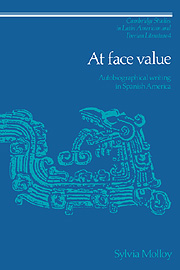Book contents
- Frontmatter
- Contents
- Acknowledgments
- Introduction
- PART I THE SCENE OF READING
- PART II CHILDHOOD AND FAMILY TALES
- PART III MEMORY, LINEAGE AND REPRESENTATION
- 8 Autobiography as history: a statue for posterity
- 9 Shrines and labyrinths: a place to remember
- 10 First memories, first myths: Vasconcelos' Ulises criollo
- Notes
- Bibliography
- Index
8 - Autobiography as history: a statue for posterity
Published online by Cambridge University Press: 14 September 2009
- Frontmatter
- Contents
- Acknowledgments
- Introduction
- PART I THE SCENE OF READING
- PART II CHILDHOOD AND FAMILY TALES
- PART III MEMORY, LINEAGE AND REPRESENTATION
- 8 Autobiography as history: a statue for posterity
- 9 Shrines and labyrinths: a place to remember
- 10 First memories, first myths: Vasconcelos' Ulises criollo
- Notes
- Bibliography
- Index
Summary
Monument, in the most ancient, original sense of the word, means a work created by human hands with the specific purpose of maintaining heroic feats or individual destinies (or a combination of the two) always alive and present in the consciousness of future generations.
Aloïs Riegl, The Modern Cult of MonumentsSpanish America is much given to reminiscence. Borges' Funes, inexorably storing perceptions like so much refuse and condemned to a pointless lucidity, is but a nightmarish emblem of an activity much practiced in Spanish American fiction. As he lies dying, Carlos Fuentes' Artemio Cruz remembers. In order not to die, Ixtepec, the town of Elena Garro's Recuerdos del porvenir, remembers. Dolores Preciado remembers in Rulfo's Pedro Páramo and her spurious recollections lead her son to his death. For García Márquez, remembering is a way of creating; for Onetti, remembering, and usurping what others remember, is the most gratifying form of possession. Remembering is not distinctive of the most recent Spanish American literature nor is it a feature peculiar to the twentieth century. Since Facundo, since María – one might say since the Inca Garcilaso's Comentarios reales – Spanish American literature remembers.
All fiction is, of course, a recollection. Spanish American fiction accepts that common condition and chooses to stress it by highlighting, often within the story itself, the figure of the “recollector.” Somebody, some precise individual – a narrator or a character – remembers, ruminates on the past, embellishes it, and, on occasion, writes it down.
- Type
- Chapter
- Information
- At Face ValueAutobiographical Writing in Spanish America, pp. 139 - 158Publisher: Cambridge University PressPrint publication year: 1991



